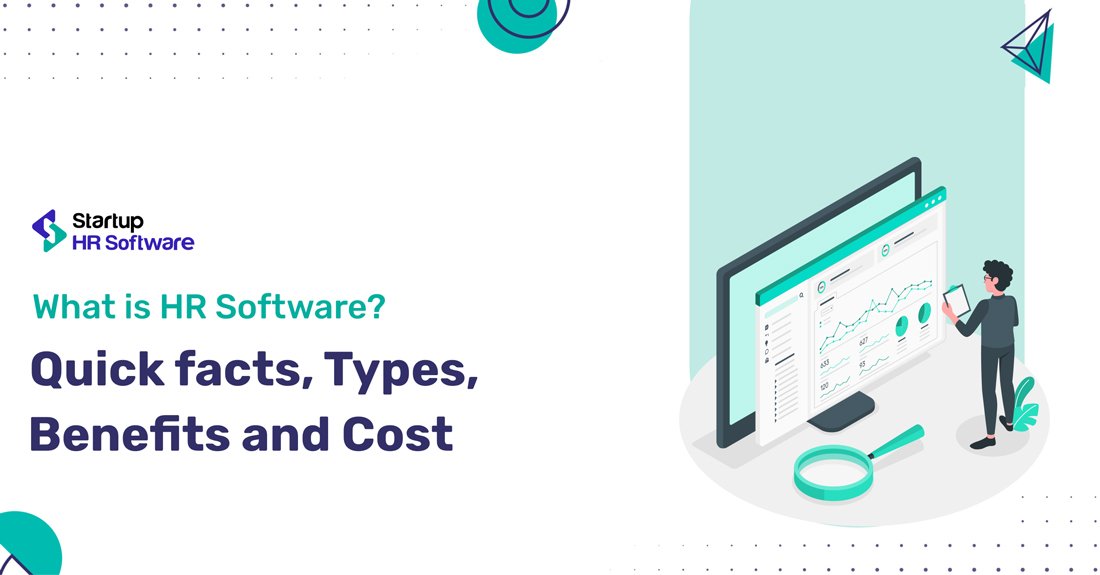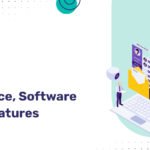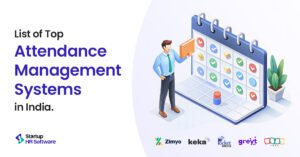
HR software is a game-changer in the workplace, making our HR tasks more accessible and manageable. Such software is all about keeping things more organized, ensuring you are following the rules, allowing your employees to maintain productivity, and improving our teams’ work.
Lately, the world of HR software has been going through some significant upgrades. Thanks to AI and machine learning, these tools are now about more than just keeping track of employee payroll. They also help us understand our teams better, make smarter decisions, manage complex HR tasks and even record ample data.
In this blog, you will learn everything what is HR software, from the basics to different types and an exclusive list of great HR software recommendations for you.
What is HR Software?
An HR software is a digital tool that helps an HR manager handle all the employee-related tasks in a company. No matter the size, type or age, every company can benefit from Human Resource Management Software (HRMS). It includes things like hiring, paying employees, keeping track of their information, checking their work performance, and recording their attendance.
This software puts all these tasks in one place to make things easier and more organized. HR software makes routine tasks quicker, which lets companies focus more on growing and improving their teams.
Who Uses HR Systems?
You would think that HR software only benefits a few companies or individuals. However, it is not limited to the HR department- it benefits almost everyone and every type of company.
Let’s take a closer look at who these users are and how they benefit:
1. HR Managers
Starting with the obvious, HR managers use HR software as their go-to tool for handling many tasks. From hiring to keeping track of their professional growth and performance reviews, the software helps with it all. By keeping all necessary employee data and documents in one place, your HR team can avoid any difficulties with compliance. Also, it cuts down on much manual work- giving them more time and energy to focus on what’s more important. This boosts both the efficacy and impact of their work and helps them to make a more significant contribution towards the company.
2. Finance Teams
Managing finances, including salaries, benefits, taxes, and training expenses, is a big task- mainly because it can significantly impact a business’s overall budget and financial strategy. Hence, with features like historical data comparison, benefit enrollments, and forecasting, HR software can help spot financial trends and patterns. For finance teams, the level of detail provided by a tool like this is fundamental since it helps them carry out in-depth studies, spot irregularities, and ensure that all money spent is documented well.
3. Payroll Specialists
A Payroll Specialist is the person who handles the process of paying all employees in a company. They make sure everyone gets the correct amount on payday, considering hours worked, taxes, and other bonuses or deductions. Since their job is to ensure the entire salary process is smooth and meets all legal requirements, this highly effective software is their secret weapon. It also lets employees check their payment details and benefits and change tax information by themselves, making everything transparent, easy and accurate.
4. Recruiters
Finding the right people helps build a team that matches a company’s vibe, brings new ideas, and has the skills to achieve the company’s goals. So HR software helps recruiters by quickly picking out the best candidates more innovatively, making hiring faster and better. It also makes talking to candidates better and more personal, which helps recruiters choose wisely, resulting in great hires that stick around.
5. Team Leaders
HR software is a huge plus point for team leaders across all industries. As they are integral in managing many employees as a team, this tool can help them multitask efficiently. For example, it helps with goal-setting, progress monitoring, and providing feedback using performance management systems. Leaders can also have no trouble scheduling, taking care of shifts and replying to time-off requests.
HRMS Quick Facts
- The market for HR software is expected to expand by 55% by 2025, showing an increasing shift for digital HR solutions. (MarketWatch).
- Businesses that use HR software to motivate staff can see a 21% jump in output (Gallup).
- A growing dependency on HR software is shown by the 47% of HR professionals who claimed that their company plans to grow its HR technology expenditure in the upcoming year (PwC).
- The hiring cycle can usually be cut by 18% by HR departments using software for recruitment (iCIMS).
- Due to improved productivity and lower operating expenses, businesses usually see a return on their investment in their HR software within just six to nine months of use (HR Payroll Systems).
Types of HR software
In the world of HR technology, there are 3 main kinds of software that stand out: HRMS [Human Resource Management System], HCM [Human Capital Management], and HRIS [Human Resource Information System]. Each kind has a unique purpose, catering to different categories of HR functions.
Understanding the differences between them is essential for selecting the right software that will fit like a puzzle piece for your HR needs. Whether managing day-to-day HR tasks or just the overall development of your workforce, these software types offer customizable and tailored solutions. Choosing the right HR & payroll software type can boost how a company handles HR tasks. This leads to better work done faster, digitally more intelligent management of employees, and, in the end, a more vital than ever company. Let’s take a look at the three different types of HR software.
HRMS
An HRMS (Human Resources Management System) software is designed to automate and simplify the daily time-consuming activities an HR team faces. Unlike other HR tools, HRMS is an all-in-one solution, managing everything right from payroll distribution to any added benefits. This makes it perfect for businesses looking to streamline all their HR activities with a one-stop solution.
- Performance Management
An HRMS software helps track how healthy employees are doing their jobs. It will guide managers in setting individual goals for their team members, providing constructive feedback, and grading their performance, making it easier to support and improve the team holistically.
- Leave and Attendance
HRMS software is your friend if you have employees who specifically need to be kept under the radar for their leaves and time-offs. It also helps track vacation days and sick leave, so everything’s fair and organized.
- Payroll
HRMS is also an expert at handling your company’s finances, like calculating paychecks, deducting/adding taxes, and bonuses, if any. It makes sure everyone gets paid correctly and on time without any errors.
- Applicant Tracking System
This feature helps find and hire the right people from several applicants. It can organize resumes from best to worst, helping you pick the perfect candidates.
- Training and Development
HRMS software also works after professional learning and development. It keeps track of training programs and helps employees learn new and relevant skills, supporting their career growth.
HCM
HCM (Human Capital Management) software is designed to manage the entire employee or “human capital” lifecycle, from recruitment to retirement. This software’s integrated approach sets it apart, combining different functions in one place. Whether in the cloud or on-premise, one main focus of HCM (Human Capital Management software) is to improve talent management.
- Improve HR operations
HCM software speeds up HR tasks, making them quicker and easier. It can also automate paperwork on your behalf, giving HR teams more time to pay attention to meaningful work.
- Data-driven decisions
Sometimes, statistical research is what you need to make better decisions. So, an HCM gives you all the necessary numbers and trends regarding your workforce. This is the solution to make smarter choices based on solid data.
- Manage Employee Data
Storing all kinds of employee information, from personal contact details to their job history, in one place is made easier with an HCM. It makes finding, updating, changing, and managing that data simple.
- Workforce management
This software lets you plan and track your team’s work and progress, be it their routine schedules or upcoming tasks.
Attract, engage, and retain: You can make every employee’s experience satisfactory. Features like easy-to-use job portals, personalized and customizable onboarding experiences, constant learning programs, and clear career progression paths make HCM software effective in attracting and keeping top talent.
Benefits of HR Software
1. Fully Automated HR Software
Imagine not needing to do any of those repetitive and sometimes complicated HR tasks one by one by hand. That is what a fully automated and intelligent HR software can do – it will take the responsibility of tracking each employee’s time-offs or requests, payroll management, and updating employee records right on time without you even lifting a finger. This feature is a total game-changer because it lets an HR manager and all employees put their sole focus on more important work, making the workplace better for everyone. It’s like having a super-efficient and 24/7 intelligent assistant that is never off-duty.
2. Accurate Data and Reporting
Getting data that is factually correct and updated on time is a must, especially when it comes to the human resource management field. However, with HR software, you can trust that all the information about your employees, from the number of hours worked to their detailed work progress, is 100% accurate. This is crucial because it means decisions are made using utterly reliable info. For example, having correct data promises that salary hikes or promotions will be utterly equal.
3. Long-Term Cost Savings
It would help if you thought of HR software as a wise investment. Initially, it’s just another added expense, but it saves your business much money over time. Automating tasks and improving efficiency eliminates the need to hire extra staff to handle different HR tasks. Plus, avoiding errors in payroll and maintaining a healthy workplace also reduces costly errors and ensures employee retention.
4. Data Analytics and Reporting
Regarding the efficiency of data analytics in HR software, you can see trends and patterns that you could have otherwise overlooked. For example, it can show if a particular team or department is constantly working overtime or if one department has a high/slow turnover rate. This insight is helpful before making big decisions because it’s based on crisp and factual data.
How To Choose the Best HR Software?
Now that you know all the plus points of HR software, you should know how to choose the best one. Go ahead and ask yourself these 6 questions before choosing your go-to software:
1. Is The Software Pocket Friendly?
First, think about how much you can spend from your budget without going overboard. The best HR software shouldn’t necessarily have to be hard on your pockets. It should offer a good value and fit all the desired features on your list. So always look for transparent pricing with no hidden costs or “tax” and added options to scale as your business grows.
2. Is The Software Integrated With Other Systems?
Your new HR software should mingle well with the other programs you use. Whether it’s your email system, calendars, project management tools, or accounting system, a clean, wholesome and smooth integration means less hassle and more efficiency.
3. How Automated Is The HR Software?
The more the software can work independently, the less you have to. Automation in HR software means it can single-handedly take care of scheduling interviews, tracking applications or even managing leave requests without needing you to intervene manually every time.
4. How Great Are The Features?
Next, ask yourself what that software brings to the table. Does it include all your HR needs, from recruiting and onboarding to performance management, payroll management, and offboarding? If you’ve checked off all your features, it’s time to give this software the go-ahead.
5. Is Customer Support Worth It?
Sometimes, even the best software can have its minus points. It could be a lagging dashboard or slower updates. And when it does happen, you want a quick and helpful support team to get you the help you need. Excellent customer support is non-negotiable, so choose software that is always ready to help you with solutions and answers.
6. Do They Offer A Free HR Software Demo?
Last but not least, always try before you buy. A demo lets you take a quick peek at what you’ll be investing in. This free demo will allow you to see the software in action, helping you figure out if it’s the right partner for your company. To give you a clearer and more in-depth guide, you can read our blog on Top 20 HR Software, which has an extensive list of reviews and pricing.
StartupHR is the ultimate matchmaker for companies that are looking for their ideal HR software. They offer a free, personalized service that pairs you with today’s leading solutions like DarwinBox and KekaHR. With a track record of helping over 7000 companies, including industry giants, StartupHR will promise to find the HR software that fits your needs perfectly.
How Much Does HR Software Cost?
HR software pricing is based on many factors, such as the number of users, features needed, and level of customization. It’s all about what you need and how big your team is.
1. Subscription Base Price
This is like a monthly, quarterly or even yearly membership for your HR software. You pay regularly to keep using the software, and the cost can sometimes go up or down depending on which features or number of users you add. In India, getting started with any basic HR software is very affordable, with plans starting at just INR 100-200 for each user every month. But if you’re after the full package with the entire feature combo, you would be paying somewhere around INR 2,000-5,000 per user monthly. Although in the USA, the starting base price is around $10-30 per user each month. And if you wish to go ahead with all the advanced features, the charge could go upto $300 per user monthly or even more.
2. One Time Payment
Think of this as going out to buy something out of a store. This involves no recurring fee, but some add-on updates or new features might cost you extra. Now if you’re looking to buy an HR software with a one and one purchase in India, you could get a basic setup for approximately INR 10,000 (although this might shift). But if you wish to customise and add some extra features, you might be looking at a price upwards of INR 5 lakh. Whereas in the USA, the starting price for a one-time only purchase could be around $200-300. But if you’re looking for more of the premium, holistic versions, you could be charged around $8000- $12000 or more.
3. Customization Software Base Pricing
This is like getting an outfit made just for you, according to your measurements. Only here do you pay according to the choice of your features. The costing of a fully customized HR software completely depends on how many unique tweaks and features you add to make the customizable HR software that perfectly matches your company’s needs. ($100,000/ INR 1 lakh).
4. Implementation & Maintenance Cost
Getting your HR software up and running might involve some initial setup work and some help from specialists. Maintaining it over time could also require additional costs for updates and support to keep it functioning correctly.
List Of HR Software In India
Here’s a list of popular HR software in India, each with tools to help you handle your HR tasks better. From all-in-one solutions to specific services, there’s something here for every business.
1. Keka
Keka HR, started in 2015, is an HR software from India that’s really made a name for itself in the HR world. It packs all kinds of HR tools into one simple package, changing how businesses handle their HR stuff and making things smoother for employees too. It is known for being super easy to use and flexible enough to fit businesses of all shapes and sizes.
2. Uknowva
Uknowva is excellent for small businesses and startups because it makes work easier by automating routine tasks and boosting both efficiency and productivity. It’s customizable, saves money, and even has a store for add-ons. Plus, it’s cloud-based and mobile-friendly, making it convenient and user-friendly.
3. Zimyo
Zimyo is a top choice for managing your team and helping companies keep and nurture great employees. It offers a simple way to keep tabs on every employee’s work with clear, up-to-the-minute reports. Setting up shifts and managing time off is a breeze, thanks to its user-friendly setup. Plus, it combines HR and payroll tasks and gives employees a portal to manage their details.
4. greytHR
GreytHR is a popular HR software used by over 20,000 companies, mainly in India and GCC countries. It’s great for small businesses, making HR tasks automatic and easy. They also have fantastic support, webinars, and a community forum where you can learn and share HR tips.
5. Wallet HR
This HR software offers a complete solution for managing employee activities, from hiring to retirement. It’s designed to track and process all employee data efficiently, making it ideal for businesses of any size. With an easy interface and helpful customer support, it simplifies leave applications, document sharing, and payroll management, providing a user-friendly experience for everyone.
6. SumHR
SumHR is a game-changer for small and medium-sized businesses, moving you away from old-school paperwork and spreadsheets. It’s all about creating a smooth experience for your team, keeping track of attendance, setting goals, and much more. SumHR is super easy to set up and use, with excellent features like automatic birthday emails and easy payslip downloads, making everyday HR tasks a breeze. And it’s free as well!
7. Qandle
Qandle is a bright, all-in-one HR tool perfect for growing companies. It’s designed to make HR tasks automatic, saving tons of time. Employees love having a single spot to check their HR details, and leaders get a clear view of the whole team. With Qandle, you can easily handle HR basics, payroll, talent management, and even travel expenses. Plus, its user-friendly design and flexibility mean no more boring Excel sheets; everything from leaves to payroll is a click away.
Conclusion
HR software is a game-changer for professionals in today’s hectic workplace as it saves so much paperwork and frees HR professionals up to concentrate on some other meaningful work.
StartupHR Software is your go-to guide for finding the perfect HR software, offering you a hassle-free, cost-free and error-free service for your unique business needs. With a deep knowledge of exactly what startups and businesses of all sizes need, they can link you with top HR software options like DarwinBox, KekaHR, and Zimyo.
Whether you’re a growing startup or an already well-established brand, their dedicated team of experts are there to help you pick just the right HR solution. With a successful history of guiding more than 7000 companies, such as industry leaders Shiprocket and Enrich, StartupHR is your trusted partner in navigating the HR software arena!






